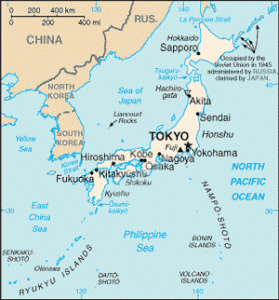Has N. Korea shot its load?
By Fred Varcoe
U.S. Defense Secretary Robert Gates said recently that without America’s presence in the region, “North Korea’s military provocations could be even more outrageous or worse” and China “might behave more assertively toward its neighbors.”
Well, thank God for the American bomb.
Except that America’s presence failed to stop North Korea sinking South Korean warship the Cheonan (as South Korea claim) or prevent North Korea from unleashing an artillery barrage on Yeonpyeong Island close to the disputed sea border between the two countries. It didn’t stop North Korea bombing a South Korean airliner in 1987; it didn’t stop North Korea trying to blow up the South Korean cabinet in Myanmar in 1983; and it didn’t stop North Korea kidnapping Japanese and South Korean citizens for over half a century.
Ah, but surely it has stopped North Korea from invading the South.
Well, it didn’t stop them in 1950 when there was a massive American military presence right next door in Japan, where the U.S. had demonstrated their nuclear might just five years before (the U.S. had a minimal presence in South Korea at the time).
It has been argued that America’s military presence in the region is more of a provocation than a source of appeasement. Certainly on a local basis, American troops are despised both in Japan and South Korea. For some they are a permanent blot on the landscape.
But they are not immovable. America’s greatest ally in East Asia – former colony the Philippines – told the U.S. military to “get the hell out of Dodge” in 1992.
According to a New York Times report, “The American military presence was assailed as a vestige of colonialism and an affront to Philippine sovereignty.”
Which is not dissimilar to how the North Koreans – and quite a few South Koreans and Japanese – view America’s presence in the region today.
You have to ask yourself how a relatively small country like the Philippines can tell the United States to leave, but the world’s third-largest economy – Japan – can’t. In addition, the Philippines were charging the U.S. $203 million a year for the right to have bases on their territory. In contrast, Japan pays in the region of $2 billion to the U.S. as “rent-a-cop” fees.
To get back to Korea, the only country that has stopped North Korea invading South Korea is North Korea. Of course, it’s all about consequences and equations. In 1950, North Korea had the support of China and the Soviet Union, and only had to consider a conventional war against a weak South. And its attack nearly succeeded. The North captured around 90 percent of South Korean territory. The South clung on desperately to a small corner of the peninsula known as the Pusan Perimeter.
After three years of fighting, the prewar divisions and stalemate remained intact. They remain intact today.
Calculation or miscalculation?
The North has growled for nearly 60 years at the U.S.-backed South, killing the odd American or South Korean, blowing up the odd airliner, kidnapping people for no apparent reason.
(The kidnapping of Japanese citizens makes no sense at all considering the number of “North Koreans” born and raised in Japan since the end of World War II. If North Korea wants to teach its spies and terrorists how to speak proper Japanese, then its own “citizens” are more than capable of doing this.)
But how have South Korea, Japan and the West reacted to the North’s most recent provocations? Simple, they’ve done virtually nothing. Of course, diplomats have expressed “concern,” but not enough to interrupt their early evening cocktails.
But North Korea may have miscalculated with its latest attack.
While South Korea’s defense minister was fired for a weak response to the North’s shelling of Yeonpyeong Island, the South still retaliated with a barrage of 40 missiles, which, according to an Asian Times report by Washington-based analyst Yong Kwon, had a terrifying effect on the North:
“Radio Free Asia reported that the shelling of the Yeonpyeong Island caused widespread panic throughout North Korea because of the belief that the United States would retaliate militarily.”
South Korean President Lee Myung Bak has vowed to use significant force if the North repeats its missile attack. This is widely interpreted as meaning air strikes against the North.
The North’s reaction? Let’s have some more six-party talks.
Initially, the South opted not to play that game again. And why would they? The six-party talks are a joke. If the North is caving in after a mild missile response from the South and the mere threat of an air strike, what incentive is there for the South to carry on playing the North’s game?
The North is not willing to negotiate away any of its advantages, certainly not the one ace it’s got over the West: its perceived nuclear capability, which is still unproven and may be more bluff than reality. But if the North is not up for a minor fight over its border, is it up for any fight at all?
The North may well have played its last card. If it can’t intimidate militarily, it can’t intimidate, period.
What actually, can the North do?
It can resort to terrorism, which, as the Palestinians (of old) and Al Qaeda have shown, can be more effective than overt military action, but such action would only serve to isolate the country more and could lead to strong countermeasures by South Korea, Japan and America. And blowing up planes, kidnapping people and assassinating politicians hasn’t worked for the North, so far.
It can attack South Korea again, but this would initiate a serious response from the South (and possibly the U.S.) and the North would then be forced to back down or escalate the conflict.
Such escalation could lead to war, but the North knows that while it can win some significant battles and inflict serious damage on the South, it will never win a war. War is an end game with the North defeated.
Could it use nuclear weapons? Theoretically, yes; practically no. Again, this would be an end-game tactic that would destroy North Korea, and the only raison d’etre for North Korea is to sustain the current regime. Stalemate for them is victory.
An invasion of the South would ultimately destroy the North. And there are serious doubts that the North could sustain a war beyond a few weeks. A ground war requires food and supplies and fuel and it’s unlikely that North Korea possesses enough of these to wage a credible campaign. North Korea may have great numbers – 7 million is the scary figure Western media like to use – but, again, it’s quality vs. quantity. In the Korean War, many soldiers from the South defected to the North. That’s not going to happen again. The reverse is far more likely.
Also, a war – or even a significant escalation – would involve China, but not like 60 years ago when half a million Chinese “volunteers” spontaneously flooded into Korea to aid Kim Il Sung. While half the West’s economy now seems to be tied up in China, nearly all of China’s economy is tied to the West. Do you think the Chinese people/government are going to sacrifice their wealth and stability to assist North Korea?
Wikileaks seem to suggest that the Chinese have less influence and less interest in North Korea than people in the West have given them credit for. The North needs China – without it, it would probably die. China does not need the North and the argument that a buffer is required between capitalist China and major trading partner South Korea just doesn’t hold water any more. China can afford to drop North Korea; it can’t afford to cut its ties with the West.
And if the South is going to carry out air strikes on the North, a good place to start would be the bridges over the Yalu River that link the North to China. Such a move would finally force China to take a stand on the North and their message to Pyongyang would have to be: Start a war and this time you’ll have to start it and finish it without us. Added to which, northeast Asia without a North Korean problem would ease tension in the region and allow China and the West to intensify their capitalistic intercourse.
While North Korea is the only country that can initiate a war on the Korean Peninsula, South Korea is the only country that should be making the decisions on how to prevent one.
The United States is quite clearly out of its depth and its involvement in the affairs of other countries in recent decades has been nothing short of embarrassing. Iraq, Libya, Palestine, George Bush/Tony Blair, Japan even (the Futenma debacle). My associations with Saudi Arabia, South Korea and Japan have shown me how ridiculous America looks to the citizens of these countries. Politically. Of course, many admire the economic achievements of the U.S., but the Washington would be foolish to think that they have earned universal respect in these and other countries.
And the other “players” in the Six-Party equation?
Japan is arguably the weakest country in the world when it comes to political clout and diplomacy. The government changes yearly and is invariably headed by a weak-willed idiot. Many Japanese would love it to have political power to match its economic strength, but don’t hold your breath. Tony “The Poodle” Blair has nothing on the lap-dancing lap dogs of Nagatacho.
China. Oh yes, the country that has influence on North Korea. North Korea is far less of a puppet state of China than Japan or South Korea is of the United States. China does not dictate to Pyongyang. But China is friendly – very, very friendly. And for a reason.
Any major instability in North Korea would have refugees rushing over the Yalu River into China rather than over the heavily mined DMZ into South Korea. And who or what would replace the Kim dynasty should it be removed from power? The only alternative power in the North is the army and this, reportedly, is extremely factional. An internal power struggle could result in more of the same (i.e., a new North Korean Saddam Hussein or Moammar Gadaffi to deal with) or a pro-West faction (or at least, a pro-West rapprochement faction).
Resolving to resolve nothing
Communist China’s only option in this whole game is to maintain the status quo. It is horrified by the prospect of a pro-Western, pan-Korean government and it certainly doesn’t want any more Koreans clogging up its border cities.
So it reaffirms its faith in the Six-Party Talks, knowing that they will never, ever bring about a resolution – certainly not the kind of resolution that the West anticipates. The purpose of the Six-Party Talks is to get the North to give up its nuclear weapons. This won’t happen, especially as the North watches the West bombing the crap out of Libya. North Korea and China win by prolonging the Six-Party Talks. Just as war is an end game, talks are a no-end game.
In an article in the April/May edition of the RUSI (Royal United Services Institute) Journal by respected East Asia watchers Scott Snyder and Byun See Won, the writers talk of “the Six Party Talks through which North Korea’s nuclear programme and other issues must be addressed.” From the diplomatic perspective, this seems logical. Talking is what diplomats do. But if it’s resolution that you want, this won’t fly.
To their credit, the writers mention “doubts about China’s credibility as a broker of the Six Party Talks” and even suggest that China may have given North Korea a “blank cheque to pursue provocations with apparent impunity.” But this is also a misreading of China’s position. China may not be dictating to Kim Jong Il and at times may appear not to have the ability to control Pyongyang, but its patience would wear out rapidly if tensions escalated to extensive military action. For China, stalemate is the only answer; it certainly doesn’t want a resolution.
And it certainly doesn’t want a war. Snyder and Byun point out: “According to U.S. officials, Chinese party leaders have reportedly expressed increasing anxieties about Pyongyang’s provocations,” although the Chinese military apparently are less concerned.
China’s military may be flexing its muscles in other areas, but North Korea knows that it won’t get backing for any large-scale military action against the South (although it was interesting to note that while China condemned U.S.-ROK military exercises in the Yellow Sea, it failed to condemn the North’s bombardment of Yeonpyeong Island).
The other player in the six-party talks is Russia, presumably invited as it, too, borders North Korea, but also because they’d get extremely pissed off if they weren’t dealt with on equal terms. Russian involvement is peripheral. Russia is only interested in scoring diplomatic points, mainly against the West.
Gates has said, “There must be concrete evidence that [the North’s leaders] are finally serious about negotiations.” Well, good luck with that one, Mr. Gates, ‘cos you’re not going to get it.

In an insightful Asia Times Online piece (“Misunderstandings May Prove Fatal”), Kwon puts it thus:
“The bewildered diplomatic and military overtures to Pyongyang and Beijing are signs that Washington has barely begun to take a serious interest in the country that it has been confronting for over 50 years. Currently, too many policies towards the DPRK are made using presumptions and analogies that are fundamentally inconsistent with what little we do know about the regime’s objectives and perceptions. … Washington has placed a profound amount of faith in China’s leverage on Pyongyang. … Ultimately, the current policy of treating the DPRK as a Chinese client or puppet state is inherently flawed.”
Kwon concludes: “The assumptions that drive American foreign policy towards the DPRK are too often historically uninformed, and over-exaggerate or misinterpret the threats posed by Pyongyang. The Obama administration should recognize this and treat North Korea as it should be treated, a uniquely North Korean problem.”
That’s the first step. The second step is for Seoul to distance itself from Washington. Don’t give in to American blackmail as the Japanese did over the Futenma Air Base in Okinawa.
Diplomatic sources have suggested that Seoul is keen to press a hard line against the North. Pressure not to do so comes from outside. The South Korean government must have the courage of its convictions. North Korea is now in a uniquely vulnerable position. Its supreme leader seems to know he will not live too long (although he looked healthy enough on his recent trip to China) and it now has serious doubts about its ability to scare the South. Economically, it’s as much a basket case as ever and food shortages are a constant threat. There have been isolated reports of unrest in North Korean cities. Depriving the North of assistance will strengthen the South’s hand, assuming it can rid itself of brotherly guilt by making its people suffer more. While many in the South don’t want instant reunification, they still regard Korea as one country separated by politics (and blame Japan, Russia and the United States for the division). The North currently believes that the South will respond with force if another Yeonpyeong occurs. For that to be effective, that’s exactly what the South should do.
Raising the stakes is a risky game, but the North has never had to call the South’s bluff before. The South must now play its cards right if it wants to win the game.
END

